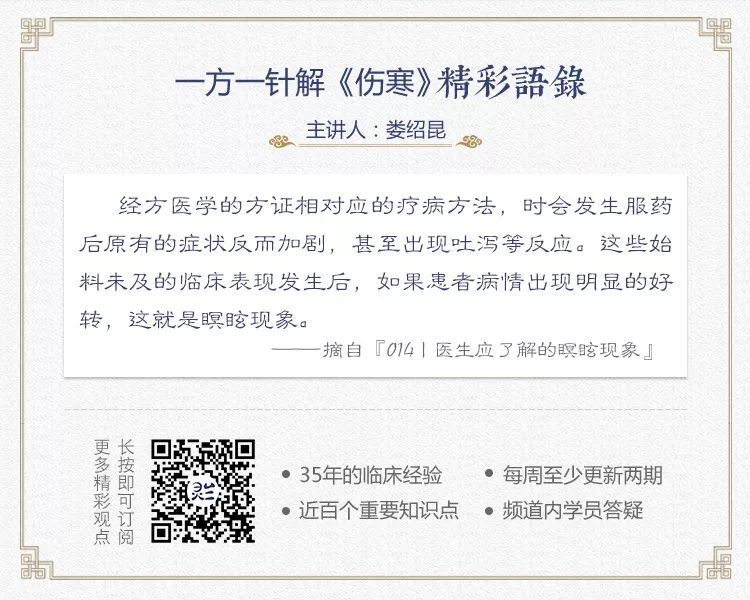Read articles in the morning, and check comments in the evening.
Pin the TCM Book Club, click the blue text above.

TCM Book Club Issue 1633
One issue daily, accompanying the growth of TCM practitioners
IIntroduction: During a consultation, it is essential to ask about common, tangible aspects of daily life that everyone experiences. These are the indispensable elements of life: “eating, drinking, defecating, urinating, and sleeping.” Although the terms may seem crude, they reflect the complete state of life for both the average person and the patient. (Editor: Ju Ye)

On the Diagnosis of “Eating, Drinking, Defecating, Urinating, and Sleeping”
Author: Liu Baohe, Edited by: Cao Lijing
The author places great importance on pulse diagnosis and abdominal diagnosis in clinical practice, primarily due to their objectivity, which is not influenced by the will of the patient or the doctor, and they can truly reflect the essence of the disease.
Secondly, there is the inquiry, as pulse and abdominal diagnoses often can only determine the cause, location, and nature of the syndrome, but it is challenging to fully understand all the symptoms that arise from it.
-
Zhang Jingyue’s “Ten Questions Song”
Ancient physicians placed great emphasis on the patient’s complaints. The most famous is Zhang Jingyue from the Ming Dynasty, who wrote the “Ten Questions” in the “Complete Works of Jingyue”:
“First ask about cold and heat, second ask about sweating, third ask about head and body, fourth ask about bowel movements, fifth ask about diet, sixth ask about the chest, seventh ask about deafness, eighth ask about thirst, ninth observe pulse and color to discern yin and yang, tenth from the breath and taste to see the spirit. Although these matters are not difficult to see, one must be wise and avoid causing resentment.”
Later generations referred to this as the “Ten Questions Song”; the first eight questions pertain to inquiry, while the ninth and tenth involve pulse diagnosis, observation, and listening.
Modern interpretations of the “Ten Questions Song” have expanded it, changing the eighth question to “Ninth ask about past illnesses, tenth ask about causes, and add inquiries about medication changes. For women, it is essential to ask about menstrual cycles, whether they are delayed, rapid, or irregular, as these can all be observed. Additionally, brief notes for pediatrics, as variola and measles can also be included.” This has made it much more comprehensive.
However, the first to eighth questions of Jingyue are quite cumbersome and impractical; in fact, it is rare for a doctor to ask endlessly from cold and heat to thirst upon seeing a patient. This method is necessary for external heat illnesses, but for general miscellaneous diseases, it is unnecessary and may even provoke the patient’s resentment, leading to ridicule of the doctor as merely someone who “asks about illness and prescribes medicine.”
-
What Should Be Asked During a Consultation?
The author believes that inquiries should focus on common, tangible aspects of daily life that everyone can truly feel. These are the indispensable elements of life: “eating, drinking, defecating, urinating, and sleeping.”
Eating refers to food intake; drinking refers to water consumption; defecating refers to bowel movements; urinating refers to urination; sleeping refers to sleep. Although the terms may seem crude, they reflect the complete state of life for both the average person and the patient, and since they are common language, they are easier for the public to understand.
While the surface seems simple and clear, the connotation is rich and profound. Starting inquiries from these aspects can help discern the majority of syndromes, including their internal and external conditions, cold and heat, and deficiency and excess. To avoid overshadowing the main topic, this book will only briefly discuss these aspects, with more detailed content to be elaborated in other texts.
-
First Question: “Eating”
Can you feel hunger and can you eat? Is there any discomfort after eating? When one feels empty during hunger and desires to eat quickly, it often indicates a deficiency syndrome. If there is a sensation of heaviness in the stomach, it often indicates a sinking of the middle qi; if accompanied by palpitations and shortness of breath, it often indicates a deficiency of heart and spleen blood.
If one feels empty during hunger but experiences fullness and discomfort after eating, it indicates a combination of deficiency and excess, often due to spleen deficiency and qi stagnation.
If one feels empty during hunger but feels comfortable with small amounts of food, while feeling bloated or even in pain after eating too much, and if there is tenderness above the navel, it does not indicate a deficiency syndrome but is caused by blood stasis.
Those with liver qi stagnation may know hunger and can eat, but feel bloated and uncomfortable after eating; those with liver qi depression may not feel hungry and have no desire to eat, often described as “food is hard to swallow.”
If food feels stuck in the middle jiao and difficult to digest, it indicates dampness and qi stagnation of the spleen. There are also those who, despite feeling hungry, do not want to eat; if they feel restless and have a dry mouth and tongue, it indicates a deficiency of stomach yin; if they experience soreness in the lower back and weakness in the legs, it indicates a deficiency of kidney yin.
If warmth brings comfort, it indicates a cold syndrome; if coolness brings comfort, it indicates a heat syndrome; if one desires to eat cold food but feels uncomfortable after eating, it indicates a combination of cold and heat.
Generally, exterior syndromes do not affect eating, but if there is a sensation of qi rising in the area below the sternum, it may be accompanied by nausea and hinder eating, which requires careful differentiation.
If one feels weak and fatigued during hunger, and the condition worsens, it often indicates a deficiency syndrome. If one knows hunger but can endure for several hours while functioning normally, it often indicates an excess syndrome.
-
Second Question: “Drinking”
Are you thirsty? When do you feel the thirst most, and is there any discomfort after drinking? Distinguishing between a preference for cold or hot drinks can help differentiate between heat and cold syndromes, which is well known and will not be repeated here.
It is worth noting that if one feels dry mouth and desires to drink at night or in the morning, it often indicates yin deficiency.
If drinking does not quench thirst and one urinates immediately after drinking, it often indicates a dysfunction of the triple burner qi transformation, which can differ between bladder dysfunction and kidney yang deficiency.
If there is a gurgling sound in the stomach after drinking, and especially if there is palpitations below the heart, it indicates water retention in the middle jiao. If one feels dry in the throat and desires to drink but only takes small sips and then stops, it often indicates yin deficiency; if one only wants to rinse the mouth without swallowing, it indicates blood stasis.
-
Third Question: “Defecating”
When do you have bowel movements, what is the nature of the stool, and is there any discomfort before, during, or after defecation? General differentiation of diarrhea, dysentery, constipation, etc., is covered in internal medicine texts and will not be discussed here.
It is important to note that having a bowel movement only once every few days, but with normal stool consistency and no discomfort, should not be considered constipation.
To differentiate between cold and heat, deficiency and excess, if the stool is clear and watery with no heat in the anus, it indicates cold; if the stool is yellow and sticky with a burning sensation in the anus, it indicates heat.
If one feels comfortable after defecation, regardless of the stool’s nature, it indicates an excess syndrome; if one feels more fatigued and weak after defecation, even experiencing palpitations, it indicates a deficiency syndrome.
Additionally, if liver qi is stagnant and the spleen is not deficient, one may experience loose stools with abdominal pain before defecation, which lessens after defecation but still feels incomplete; if the spleen is already deficient, one may also have loose stools with abdominal pain before defecation, but the pain disappears after defecation, and the stool feels smooth and complete.
This is because the former has the strength to resist, while the latter lacks the strength to do so.
-
Fourth Question: “Urinating”
What is the frequency, volume, and nature of urination, and is there any discomfort before or after urination? Normal urination has a normal volume, light yellow color, and no discomfort before or after urination.
If the volume decreases and the urine turns dark yellow, in the case of an external illness, it indicates that the disease has moved from the exterior to the interior; in miscellaneous diseases, it indicates that there is often internal heat. Such patients may also experience a burning sensation during urination.
Delayed urination or incomplete urination is often seen in those with poor liver qi regulation.
Frequent urination at night with a large volume often indicates kidney deficiency.
If one urinates immediately after drinking and feels thirsty after urination, it often indicates dysfunction of the triple burner qi transformation. This condition often occurs during the day and should not be considered solely as “diabetes insipidus”; once the yang is regulated and water is transformed, the condition can resolve itself.
Additionally, those who are often tense may experience frequent urination, as seen in the symptoms of Gan Mai Da Zao Tang.
-
Fifth Question: “Sleeping”
Is it easy to fall asleep? Do you wake up easily after sleeping? Is it easy to fall back asleep after waking? Do you wake up early? Do you have many dreams while sleeping? Are they chaotic dreams or frightening dreams?
Insomnia patients are very common in outpatient clinics, so it is necessary to inquire about sleep conditions. After treatment, if insomnia is resolved, other symptoms often improve as well.
In miscellaneous diseases, those who eat and sleep normally tend to respond well to treatment, while those who do not find it more challenging.
“Yang enters yin to sleep”; if it is difficult to fall asleep, it is often due to obstruction or disturbance from pathogens, or it may require clearing heat, transforming phlegm, digesting food, relieving depression, or dispelling stasis, and appropriate treatment can yield results.
If one wakes up easily, sleeps intermittently, and finds it difficult to fall back asleep, it may indicate both excess and deficiency; the excess is as mentioned above, while the deficiency may be due to yin deficiency with excess fire, heart and spleen blood deficiency, or insufficient liver blood, leading to sleeplessness, with yin deficiency and excess fire being the most common.
Waking up early is often seen in heart and spleen blood deficiency or insufficient liver blood.
Unstable sleep, with intermittent waking, accompanied by dizziness and leg weakness, often indicates excessive liver yang, disturbing the liver spirit; if accompanied by sadness and poor appetite, it indicates liver qi stagnation and lack of nourishment for the liver spirit.
Frequent chaotic dreams often indicate phlegm obstruction, and if accompanied by irritability, it indicates phlegm heat.
If one wakes up from nightmares, it indicates deficiency of heart and gallbladder qi.
In general, obtaining normal sleep can significantly alleviate many conditions, often indicating a deficiency syndrome; if one has normal sleep but the condition does not improve, or feels more fatigued upon waking, it may be due to damp obstruction, qi stagnation, or blood stasis, all indicating an excess syndrome.
Recommended Reading
Common Pitfalls in Inquiries
Historical Maxims for Inquiries in Medicine
|
I Copyright StatementCopyright belongs to the relevant rights holders. If there are any improper uses, please feel free to contact us. |


